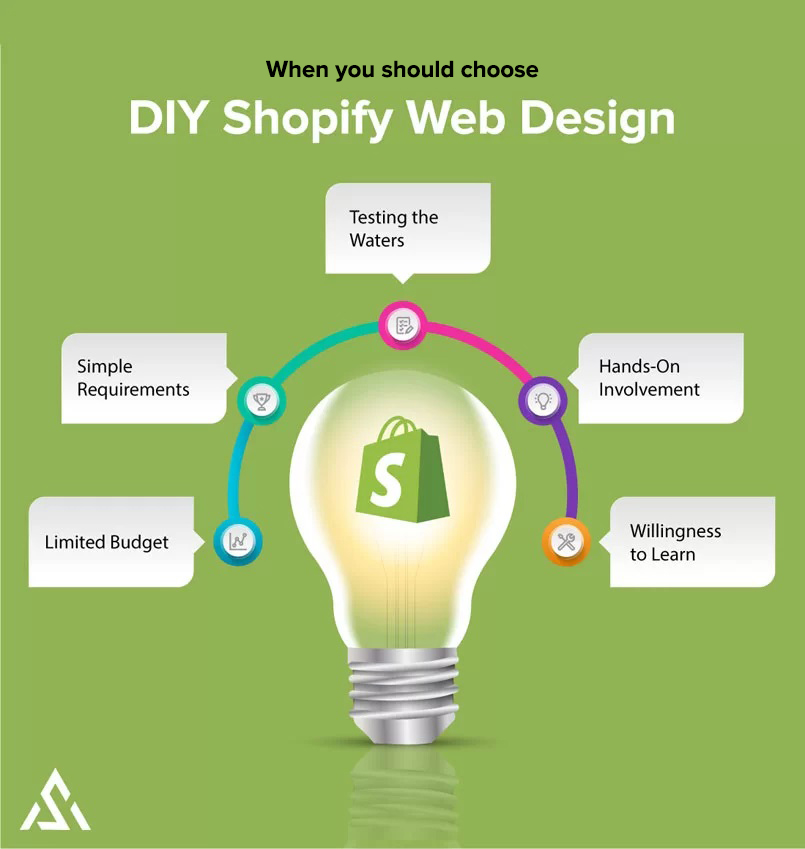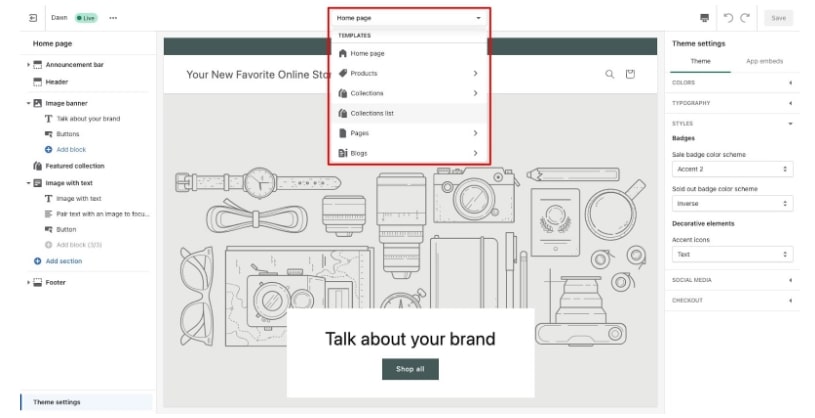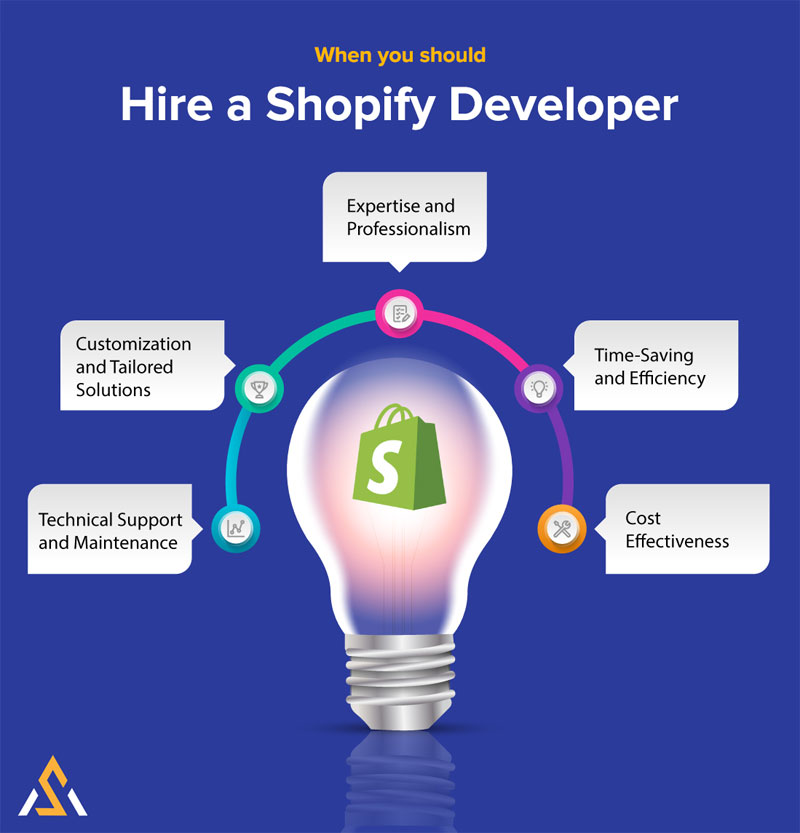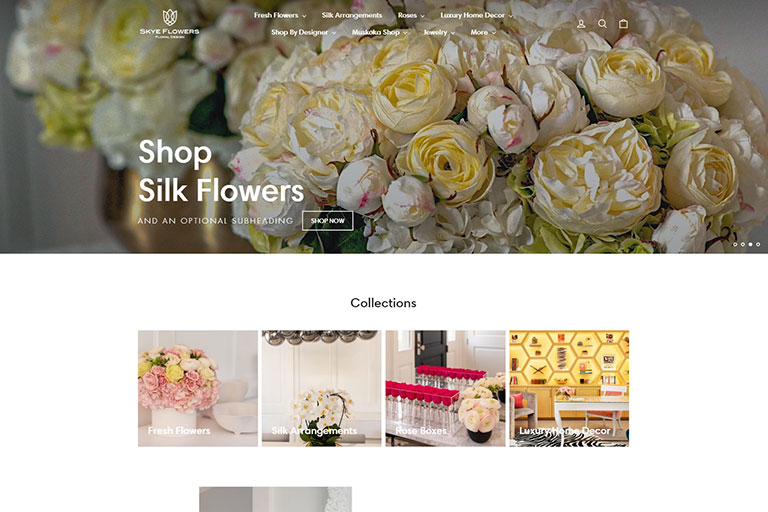Table of Contents
Table of Contents
- DIY Shopify Web Design
- Cost-effectiveness
- Control and Flexibility
- Learning Opportunity
- Quick Implementation
- Hands-On Involvement
- Hiring a Shopify Developer
- Expertise and Professionalism
- Customization and Tailored Solutions
- Time-Saving and Efficiency
- Technical Support and Maintenance
- Scalability and Future-Proofing
- Cost Effectiveness
- DIY Shopify Web Design vs. Hiring a Shopify Developer
- When you should opt for DIY Shopify Web Design?
- Testing the Waters
- Simple Requirements
- Hands-On Involvement
- Limited Budget
- Willingness to Learn
- Quick Implementation
- How To Find the Right Shopify Partner
- Assess Your Needs
- Research and Gather Recommendations
- Evaluate Expertise and Experience
- Communication and Collaboration
- Transparency and Pricing
- Wrapping up
Add a header to begin generating the table of contents

With the rise of platforms like Shopify, businesses have the opportunity to create stunning digital storefronts that cater to their unique needs and captivate their target audience.
The dilemma surfaces: Should businesses opt for the do-it-yourself (DIY) route or seek the expertise of a Shopify developer?
Shopify stands out among eCommerce platforms because of its outstanding features for crafting top-tier online stores. Shopify might be your ideal platform if you’re a small business owner seeking a swift and straightforward setup.
Whether you opt for the expertise of Shopify developers or the hands-on approach of DIY Shopify Web Design, you can create a distinctive and operational online store.
DIY Shopify Web Design:
Empower your small business with our DIY Shopify Web Design for a quick, easy, and unique online store setup. With Shopify’s user-friendly platform and a myriad of customizable templates and tools, DIY enthusiasts can build a Shopify websites without the need for extensive coding knowledge or technical expertise.
Business owners prefer DIY Shopify Web Design because of:
1. Cost-effectiveness
DIY Shopify web design is often more budget-friendly than hiring a developer, as it eliminates the need for professional fees.
Business owners can save money by leveraging Shopify’s affordable subscription plans and free or low-cost themes and apps.
2. Control and Flexibility
With DIY web design, business owners have complete control over the design and development process, allowing them to customize their online store according to their vision and brand identity.
They can experiment with different layouts, colors, and fonts to create a unique and personalized storefront. The ability to experiment with design elements provides a sense of autonomy, even for those new to the world of web design. It’s a chance to create a unique and authentic representation of your brand.
3. Learning Opportunity
Engaging in DIY web design provides business owners with a valuable learning opportunity to gain insight into website development and management.
By navigating the Shopify platform and experimenting with its features, entrepreneurs can enhance their digital literacy and acquire skills that benefit their businesses in the long run.
4. Quick Implementation
DIY Shopify web design offers a relatively quick and straightforward implementation process, enabling business owners to design a Shopify store for their business in a timely manner.
With pre-designed Shopify themes and intuitive drag-and-drop editors, entrepreneurs can expedite the setup process and start selling products sooner.
5. Hands-On Involvement
By taking a DIY approach to web design, business owners can be actively involved in every aspect of the process, from conceptualization to launch.
This hands-on involvement fosters a deeper connection to their brand and allows for greater agility in responding to market trends and customer feedback.
Hiring a Shopify Developer/Agency
When it comes to bringing your Shopify store to life, the path you choose can significantly impact its success and longevity. We discussed about DIY web design approach and its benefits. Now, let’s delve into the world of hiring a Shopify developer and explore the invaluable expertise they bring to the table.
1. Expertise and Professionalism
Business owners opt to hire Shopify developers for their specialized expertise and professionalism in website design and development.
Developers bring years of experience and knowledge of best practices to the table, ensuring a high-quality, polished result that reflects the business’s professionalism and credibility.
2. Customization and Tailored Solutions
Hiring a Shopify developer allows business owners to access customized solutions tailored to their specific needs and objectives.
Developers can create bespoke themes, integrate advanced features through Shopify Apps, and implement unique functionalities that align with the business’s branding and objectives, providing a competitive edge in the market.
3. Time-Saving and Efficiency
With a Shopify developer at the helm, business owners can save valuable time and resources by delegating the intricacies of web design and development.
Developers streamline the process, handling tasks such as coding, troubleshooting, and optimization efficiently, while business owners can focus on core operations and strategic decision-making.
4. Technical Support and Maintenance
Once the development is complete, you can engage Shopify developers for ongoing Shopify support and maintenance services, ensuring the smooth operation and performance of your online store post-launch.
From troubleshooting technical issues to implementing updates and security patches, developers provide peace of mind and reliability, allowing business owners to stay focused on growing their businesses.
5. Scalability and Future-Proofing
Professional developers with years of experience, design Shopify websites with scalability and future growth in mind, laying a solid foundation for the business’s long-term success.
Whether it’s accommodating increased traffic, expanding product offerings, or integrating new features, developers ensure that the online store can evolve and adapt to changing market dynamics and customer demands.
6. Cost Effectiveness
While the upfront costs of hiring a Shopify developer may be higher compared to DIY web design, it can be a cost-effective investment in the long run.
Developers bring expertise and efficiency to the table, minimizing the likelihood of costly mistakes and ensuring a high-quality result that reflects the business’s professionalism.
Working with reputed Shopify developers, like Shopify Development Pros, often offers transparent pricing structures, providing detailed proposals or estimates outlining the scope of work and associated costs.
While the initial investment may be higher, business owners benefit from the expertise, customization options, and ongoing support provided by developers, which can lead to better ROI over time.
DIY Shopify Web Design vs. Hiring a Shopify Developer
Choosing between DIY Shopify Web Design and hiring a Shopify developer depends on your preferences and needs.
DIY offers cost savings and control, ideal for small businesses with time to spare. It’s user-friendly but may lack advanced features.
Hiring a Shopify developer ensures professional customization, optimal performance, and efficient time use. While it requires a financial investment, it’s suitable for businesses seeking a polished, unique, and feature-rich online store.
Consider your budget, time constraints, and desired level of customization to make the right choice for your e-commerce venture.
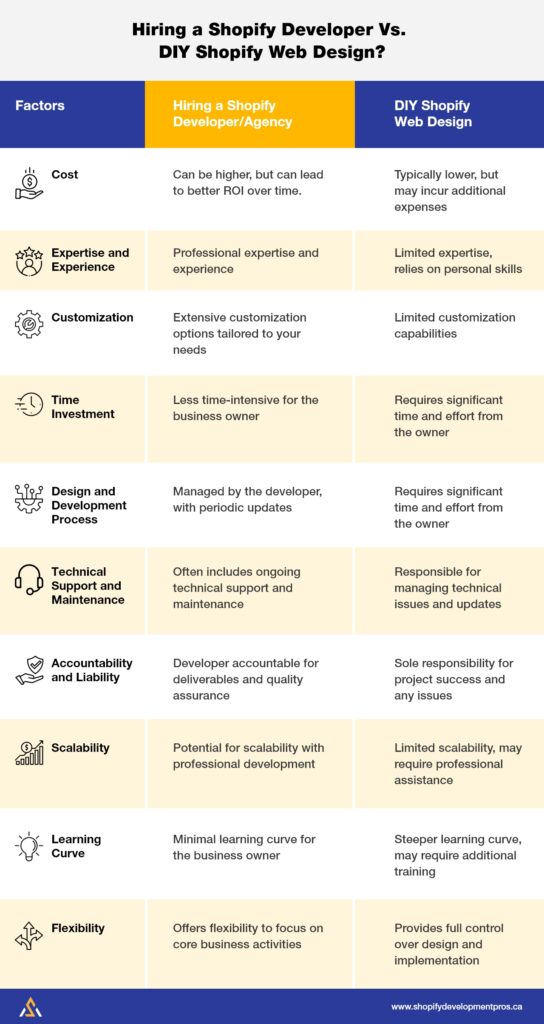
Share this Infographic On Your Website
When you should opt for DIY Shopify Web Design?
Opting for DIY Shopify web design is suitable when:
1. Testing the Waters
If you are unsure about the viability of your business idea or want to test the market before making a significant investment, DIY Shopify web design enables you to launch a basic online store and assess its performance before committing to professional development services.
2. Simple Requirements
If your online store has straightforward requirements and does not require extensive customization or advanced functionalities, DIY Shopify web design can be sufficient to meet your needs.
3. Hands-On Involvement:
If you prefer to be actively involved in the design and development process of your online store and want full control over its customization and branding, DIY web design allows for hands-on involvement and creative expression.
4. Limited Budget:
If you have a tight budget and are unable to afford the upfront costs associated with hiring a Shopify developer, DIY web design allows you to create an online store within your financial constraints.
5. Willingness to Learn:
If you have the time and willingness to learn, DIY web design provides a valuable opportunity to gain insight into website development and management. It allows you to enhance your digital skills and take full control of your online presence.
6. Quick Implementation:
If you need to launch your online store quickly and do not have the luxury of time to wait for a developer’s availability, DIY Shopify web design offers a relatively quick and straightforward implementation process.
How To Find the Right Shopify Partner
1. Assess Your Needs
Before diving into the process of finding the right Shopify partner, it’s essential to have a clear understanding of your project requirements, budget constraints, and timeline expectations. This initial assessment sets the foundation for a successful collaboration and ensures that you find a partner who can meet your specific needs. Here’s how to get started:
a. Assess Your Needs
- Determine the scope of your project, including the design elements, development functionalities, and any additional features or integrations you require.
- Consider factors such as website layout, product catalog organization, checkout process, and mobile responsiveness.
- Identify any specific customization or branding requirements to align the website with your brand identity and unique selling proposition.
b. Determine Your Budget and Timeline
- Establish a realistic budget for your Shopify project, taking into account not only the initial development costs but also ongoing maintenance and support expenses.
- Consider factors such as custom design work, ongoing app costs and app integrations, theme, and potential future scalability needs when estimating your budget.
- Define your project timeline, including key milestones and deadlines for the website launch. Be realistic about the time required for design iterations, development work, and testing phases.
c. Freelancer or a Shopify Agency
Ultimately, the decision hinges on your project requirements, budget, and preference for working style, with both freelancers and agencies offering distinct advantages to meet your e-commerce needs effectively.
Freelancers offer cost-effectiveness and flexibility, making them an attractive option for businesses with constrained budgets or specific project needs. Their direct communication and personalized attention can facilitate quick decision-making and tailored solutions. However, they can be less reliable for meeting deadlines or if project complexity increases.
However, agencies provide comprehensive services, encompassing design, development, marketing, and support, making them ideal for businesses seeking end-to-end solutions and scalability. With a team of experts and established quality assurance processes, agencies offer reassurance and reliability, ensuring the delivery of high-quality work and addressing any issues post-launch.
Whichever option you choose, prioritize clear communication, thorough vetting, and collaborative partnership to achieve success with your Shopify website.
d. Be Realistic About Your Budget
When embarking on a Shopify website project, it’s vital to be realistic about the budget you can afford. Assess your project budget and keep room for contingencies for unforeseen expenses or scope changes that may arise during the project.
2. Research and Gather Recommendations
Once you’ve defined your project requirements and budget, the next step is to research and gather recommendations for potential Shopify partners. Here’s how to navigate this crucial phase effectively:
a. Explore Shopify's Experts Marketplace
- Shopify’s Experts Marketplace is a valuable resource for finding certified developers and agencies with expertise in building Shopify websites.
- Browse through the directory to discover professionals specializing in design, development, and other related services.
b. Search on Google
- Conduct targeted searches on Google using relevant keywords to find a Shopify agency such as Shopify Development Pros, be assured that you are working with a professional Shopify web design agency with proven expertise.
- Research potential Shopify partners online and review their websites, portfolios, and client testimonials.
- Look for case studies or client success stories that demonstrate the partner’s expertise and track record of delivering successful projects.
3. Evaluate Expertise and Experience
After gathering recommendations and conducting initial research, the next step is to evaluate the expertise and experience of potential Shopify partners. Here’s how to assess their capabilities effectively:
a. Review Portfolios
- Dive into the portfolios of Shopify developers or agencies to get a sense of their past projects and design aesthetics., be assured that you are working with a professional Shopify web design agency with proven expertise.
- Look for a diverse range of work that demonstrates versatility and creativity in website design and development.
- Pay attention to the quality of design, user experience, and functionality showcased in their portfolio pieces.
b. Look for Relevant Expertise
- Assess the partner’s expertise in areas relevant to your project, such as custom theme development, app integrations, or SEO optimization.
- Evaluate their proficiency with Shopify’s platform features and APIs to ensure they can implement advanced functionalities tailored to your needs.
- Consider any specialized services offered, such as migration assistance, performance optimization, or ongoing maintenance and support.
4. Communication and Collaboration
Effective communication and collaboration are essential for a successful partnership with a Shopify developer or agency. To ensure seamless interaction and alignment with your project goals, do the following:
a. Schedule Initial Consultations
- Initial the first communication with potential Shopify partners and request quote from them. Share your vision for the website and provide as much details as possible.
- Evaluate their understanding of your project scope and their ability to offer tailored solutions that meet your needs.
b. Clarify Roles and Responsibilities
- Clarify roles and responsibilities upfront to establish clear expectations and avoid misunderstandings later on.
- Define project milestones, timelines, and deliverables to ensure alignment with your desired launch date and project timeline.
- Discuss the division of tasks between your team and the Shopify partner, including content creation, asset provision, and testing responsibilities.
5. Transparency and Pricing
- Request detailed proposals or estimates from potential partners, outlining the scope of work, timeline, and associated costs.
- Clarify payment terms, including deposit requirements, milestone payments, and final invoicing procedures, to avoid any misunderstandings or discrepancies.
- Ensure transparency regarding additional fees or ongoing maintenance costs, such as hosting fees, app subscriptions, or future updates, to accurately assess the total cost of ownership for your Shopify website.
Wrapping up
The decision between hiring a Shopify developer and opting for DIY Shopify web design ultimately hinges on various factors such as budget, expertise, time constraints, and project requirements. Both approaches offer distinct advantages and considerations, catering to different needs and preferences of business owners.
Whether you choose to hire a Shopify developer or embark on the DIY route depends on your unique circumstances and priorities. By carefully evaluating your budget, goals, and resources, you can make an informed decision that sets your e-commerce venture on the path to success. Whether you opt for the expertise of a developer or the autonomy of DIY web design, the key is to choose the approach that aligns best with your vision and objectives for your online store.
Need further information or want to explore working with Shopify Development Pros, take the first step and start the conversation today.

